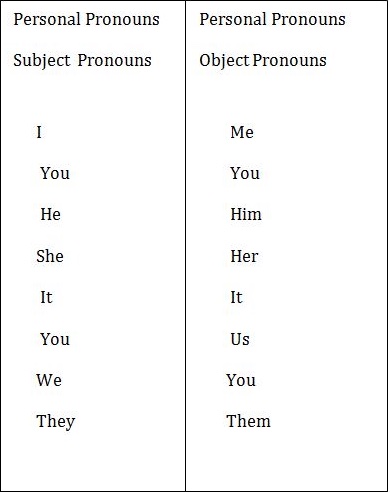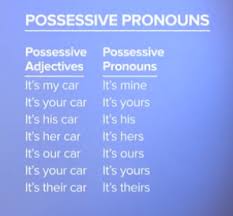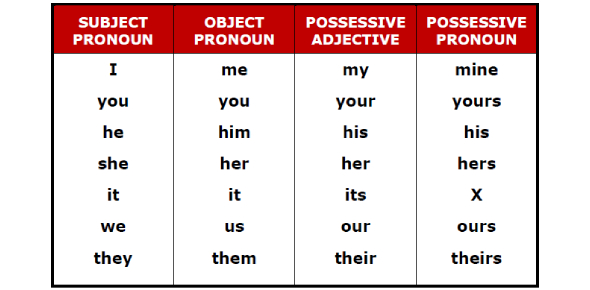Pronomi e aggettivi personali e possessivi in inglese
pronomi personali in inglese
I pronomi personali soggetto: vengono usati come soggetto del verbo.
I pronomi personali complemento: servono come complemento del verbo.

cosa sono i pronomi?
I pronomi sono piccole parole che prendono il posto di un nome . Possiamo usare un pronome al posto di un nome.Come tutti i pronomi , anche pronomi personali servono a sostituire un nome:
se il nome da sostituire è anche soggetto di una frase, allora bisogna usare un pronome personale soggetto, mentre se il pronome ha la funzione di sostituire un complemento oggetto è necessario usare un pronome personale complemento (detto anche pronome personale oggetto).
pronomi personali soggetto
Io I
Tu YOU
Egli HE
Ella SHE
Esso/a (cose/animali) IT
Noi WE
Voi YOU
Essi/e THEY
esempi:
I 'm going to go in Rome at Easter
YOU are a very beautiful woman
Will THEY live in Canada?
pronomi personali
complemento oggetto
ME me/mi
YOU te/ti
HIM gli/lui/lo
HER le/lei/la
IT Gli/lui/lo/la (cose/animali)
US Ci
YOU Vi
THEM Loro/li
esempi:
She gave ME a kiss yesterday
Theatre is very important for YOU
She likes HIM
Hhe kiss HIM
She loves HER
NB mentre in italiano il soggetto spesso è sottinteso, quando si parla o si scrive in lingua inglese il soggetto va sempre specificato.
Questo perchè i verbi inglesi non cambiano ad ogni persona, e ci si potrebbe confondere. In italiano ,ad esempio , potremmo dire vado al mercato oppure Io vado al mercato; in inglese invece dobbiamo sempre dire I go to the market.
Quando ,invece ,un verbo italiano ha il soggetto sottinteso (verbo impersonale),in inglese dobbiamo necessariamente usare il pronome it come soggetto della frase :
piove = it rains
sembra buono ? it seems good
pronomi possessivi in inglese

si usano per sostituire un nome :
Kate's house is white . Mine is Yellow.
(La casa di Kate e' bianca.La mia e' gialla.)
I pronomi possessivi non sono mai seguiti da un nome ,bensi' lo sottointendono :
questa macchina e' mia
(This car is mine)
a differenza dell'italiano , in inglese i pronomi possessivi sono invariabili : ad esempio italiano dobbiamo distinguere tra il mio,la mia ,io miei ,le mie , mentre in inglese,essendo invariabile, si usa sempre mine.
Un'altra differenza rispetto all'italiano e' che i pronomi possessivi inglesi non sono mai preceduti da un articolo ,quindi se dobbiamo dire dire 'un mio amico' dobbiamo usare la costruzione 'a friend of mine' .
Gli aggettivi e i pronomi possessivi sono una parte del discorso che ha la funzione di indicare a chi appartiene una determinata cosa ,animale o persona. Sono facilmente riconoscibili chiedendosi di chi?
aggettivi possessivi in inglese
Gli aggettivi possessivi sono usati per fornire la descrizione di un nome e ,seguendo le regole di tutti gli aggettivi, precede il nome:His house is more confortable than my house.
(La sua casa e' piu' comoda della mia casa.)
Gli aggettivi possessivi, quindi, vengono sempre seguiti da un nome e, mentre in italiano sono variabili (accordandosi con il nome a cui si riferiscono), in inglese sono invariabili: Il mio cane, la mia penna, le mie macchine my dog, my pen, my cars
a differenza dell'italiano, non possiamo usare articoli prima dei pronomi possessivi:
la mia penna = my pen
(il the e' sotto inteso)
the my pen= errore
- esercizi aggettivi possessivi inglese
- esercizi di inglese
- Who whom whose which
- esercizi who whom whose which
- esercizi question words
- grammatica inglese
- le preposizioni di tempo e luogo
- avverbi in inglese
- domande con have/have got
- domande in inglese
- congiunzioni in inglese
pronomi personali soggetto e oggetto
Gli aggettivi e i pronomi possessivi servono ad indicare a chi appartiene una cosa o persona.
aggettivi e pronomi possessivi
Gli aggettivi possessivi accompagnano un nome:
Il mio cane.
La tua automobile.
I pronomi possessivi si usano in assenza di un nome.
In questo caso il pronome è al posto del nome:
La mia è rossa.
Quale disco ascoltiamo? Il mio.

esempi
I
--I'm doing my homeworks
--I'd like to be at b1
level when the class will be finish
--I 'm going to go in Rome at Easter
--My new girlfriend and I
get on well together-
ME
-- If you don't know what I mean you may ask me to repeat
--She gave me a kiss yesterday
-- She bought the bread for me
MY
-- Yesterday I was listening my radio while I was going to work
--I go to work with my car
--I like my job
--While I was listening music
--My sister arrived at home
MINE
--The opel corsa parked out of this building is mine
--Is this opel corsa your car? yes it is mine-
--You give me your number and I'll give you mine-
YOU
--You are a very beautiful woman
--Have you lived in ireland for a long time?
--When do you think our english level will be b2?
--Do you think it will be necessary any years?
YOU
--I showing my homeworks to you
-- Theatre is very important for you
--When the class will be finish we having a dinner with you
YOUR
--Your eyes are so blue!
-- Has your laptop a bag?
--May I borrow your pen? mine don't work
YOURS
--Our english is worse than yours
--Did the person, who come here two weeks ago?
--A coworker or a friend of yours?
-- My favourit director is kubrick. what's yours?
HE
--He'll be able to swim if he keep to go to swimming pool
--Did he do all his homework?
--He works in brevini 1
HIM
--She likes him
--She kiss him
--She loves him
HIS
-- a lot of people says that Shakespeare wrote everything: his plays belongs to every time
-- this is his little recorder
--i think bob marley is most influent singer of all times: his song has had an influence for hundreds milions people
HIS
--whose is this cap? is his
--this is not his jacket,his is red
--this little recorder is his
SHE
--does she has enough time to correct all exercises?
--she likes travelling in Ireland
--she'd loves living in Dublin
HER
--I will give her this homework, and every mistake that she will correct will be a little improvement for me
--I'm going on class next tuesday and i give her this exercise
--I' m correcting a part of this homework with her next tuesday
HER
--her computer is faster than my
--my new girlfriend lives in Bologna. her home is very small.
--her bag is on the table
HERS
--I gave her my telephon number, and she gave me hers
--this car isn't hers
-- Whose is this book? It's hers
IT
--it is a nice dog-it's a beautiful day
--what is it?--it was a very good car
IT
--he prepares the food for it
--it is a dangerous snake.
she is making a trap for it.
--it is an excellent hi fi.i'm going to buy a pair of new speakers for it
--today i have bought some food for it.
ITS -- its (hole-den burrow=tana)
is too small
--it is very jealous for its bone (osso)
-- its color is very strange
WE
--if we haven't understand pronouns, it isn't your fault
--when do you think we'll be able t o know english at b2 level?
--personal pronouns and possessive pronouns are matter of elementary class,but we had forget it
US
--if most of them have failed this excercise,maybe it's better
--you will explain to us something of it.
--you give us a workbook and a cd
--you have a lot of patience with us
OUR
--this is not our workbook
--our class is very nice
--our company export mechanical components all over the world
OURS
--whose is the red house in Parma? It's ours
--this workbook is ours
--she is a friend of ours
YOU
--did you live in italy for a long time?
--did you have a good holiday?
--you have a good temper
YOU
--did ann bring her present for you?
--you are a good team: it will be more mork for you
--you are welcome to our home
YOUR
-- your look is original but not extravagant
--your car is red--is this your favourite film?
YOURS
--is it your bus?yes it's yours
--is it their favourit film?no it isn't
--bob is a friend of yours
THEY
-- did they live in canada?
--have they lived in canad for 2 years?
will they live in canada?
THEM
--Here's a cup of tea for them
--I can see them now
--ann is going to leave with them on holiday
THEIR
--Enrico and Stefano works in brevini 1; their office is at the first floor
--their car is too fast
THEIRS
--this laptop isn't theirs.
--my laptop as fast as yours
--these cars are damaged. Are theirs?
- aggettivi in inglese
- esercizi aggettivi possessivi inglese
- pronomi riflessivi in inglese myself yourself etc
- esercizi di inglese
- Who whom whose which
- esercizi who whom whose which
- esercizi question words
- grammatica inglese
- le preposizioni di tempo e luogo
- avverbi in inglese
- domande con have/have got
- domande in inglese
- congiunzioni in inglese